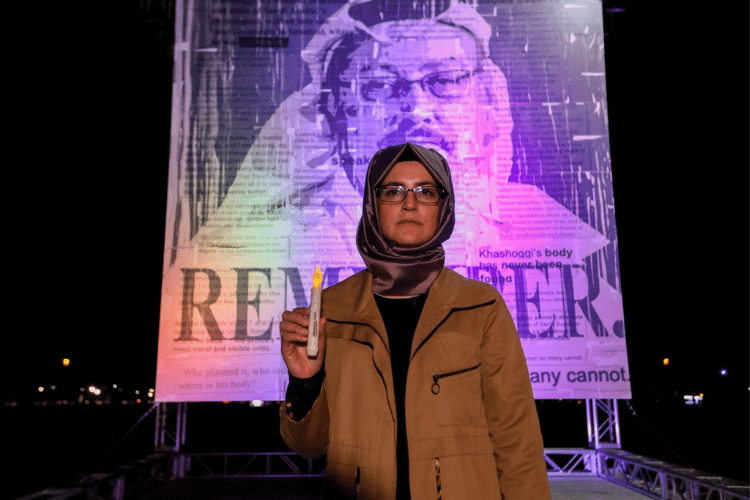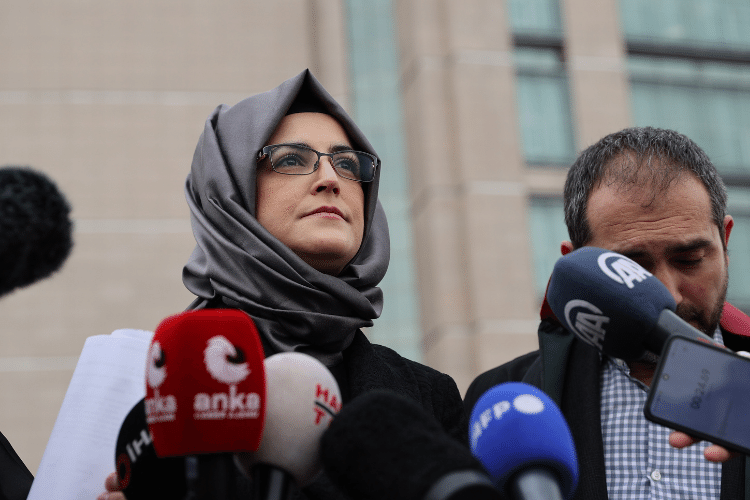Hatice Cengiz
A short portrait of our Helmut Schmidt Lecture 2022 speaker
Hatice Cengiz is a Turkish academic and a researcher in Middle Eastern studies who has published academic articles and a book on Gulf countries. She is the widow of slain Washington Post editorialist Jamal Khashoggi, who was murdered inside the Saudi Consulate in Istanbul in 2018.
Since that day, Hatice has campaigned for truth and justice in the killing of her fiancée, and for the international community to hold accountable those who ordered and planned the killing. She has testified her campaign to the United Nations Human Rights Council, the European Parliament, the US Congress and various other national parliaments.
On 10 November 2022 she delivers our Helmut Schmidt Lecture in Berlin. Ahead of this she has answered some questions.
Ms Cengiz, your life took an unexpected turn four years ago when your fiancé Jamal Kashoggi was murdered in the Saudi-Arabian embassy in Istanbul while you were outside waiting for him. Can you describe what you went through since then and where you find yourself today?
I had a hard time for a long time comprehending what happened. I thought it was a nightmare. It is as difficult to explain something extraordinary as it is to understand. As the days passed, it became more difficult to absorb. While thinking about our plans for marriage, all of a sudden, I found myself the person the whole world wanted to hear from.
Meeting or facing the media with such a difficult and bad event was one of the things I had the most difficulty with. When people are disappointed and in despair, they want to be alone as they feel no one is feeling their suffering. All I wanted was to be alone and try to understand and accept what happened. But it was not possible to do this as someone who has found herself in a very big and unbelievable assassination. Despite all the pain and devastation, I thought I needed to talk and tell people what had happened. Later on I found myself still fighting for justice. I found myself listening more carefully to the stories of all the people who had suffered.
A show trial against the murderers of Jamal Kashoggi took place in Saudi Arabia which was considered a farce by international observers. The Turkish judiciary closed its investigations in April 2022. What chances do you see that the murder will be atoned for and that the real culprits will be brought to justice? Who could bring the truth to light?
The truth is already out there, both Turkey and USA report that the assassins were nationals of Saudi Arabia. The UN Rapporteur also said that it was MBS who gave the order. Saudi Arabia authorities also admitted the murder. However, no real results have yet been achieved in the delivery of justice in this case involving the state and high-level state officials. Perhaps the reason is that countries put economic interests on the table first.
Despite all that has happened and what might happen in the future, I am still full of hopes for the lawsuit filed in the USA, talking about it and continuing the search for justice is also a kind of justice, because every day those criminals are reminded of their crime, and it is a great shame on them.
What needs to be done to keep the memory of the case alive?
The issue should always be highlighted and meaningful, where possible documentary with content-filled programmes should be organised. People who fight for freedom should be encouraged and Jamal should be commemorated over this. An event must be held every year, for example, a monument or an institution may be opened in his honour.
Since February 2022 the world is facing the Russian invasion of Ukraine which caused an energy crisis that seems to turn some rules upside down. What do you think when you see the German foreign minister visiting Saudi-Arabia negotiating oil issues?
I believe the world is getting more and more uninhabitable, but we can make it meaningful. This can only be done by prioritising human values and the importance of human rights. Mankind is a meaningful creature only with its values. The most important thing that separates us from other creatures is that we have feelings and values. Continuing relations with criminals does not only mean admitting guilt but also normalising it.
What would you advise politicians to do in the current situation?
I want to remind politicians that politics can be made more virtuous. The ones who are most remembered in history are the heroes who struggle or try to fight for their values besides the criminals. I know that not everyone can be a hero, but I can call for them to reintroduce moral values to politics.
The world order we live in is going through serious shocks. It gives no hope for humanity. Being silent against injustice makes this order more useless. After all, being just and virtuous are the things that will save us. Everyone needs this, not only me.
Looking at Saudi-Arabia today, how do you rate the current situation of the press freedom and human rights?
After Jamal, the whole world became interested in what happens in Saudi Arabia – I am following too. Jamal's murder went unpunished. The Saudi Administration continues to threaten the world with its monetary power. Every day we wake up to a new human rights scandal. Countless injustices and unfair trials continue to be in the news every day. But I think that the fact that Jamal's killers did not receive the necessary punishment for the role they played in all this. Current Saudi administration believes that we already got on with this murder. This gives them the strength to keep doing whatever they want.
Considering the last four years and the marks that they left on you, what lies ahead? What are your plans and projects for the future?
This issue has taken lots of my thoughts, I spent many hours of what could be the future for me, I talked to friends and family, seeking their opinions and sharing my input.
I could not reach the idea of sitting on the side continuing my life as normal as if nothing has happened, there are thoughts and feelings deep inside me telling me that I now have duty to fulfil, I need the fight for justice to keep going on, I need to share my experience and the struggle I went through with others to alert them, support them and maybe guide them.
Therefore, with the support of some close friends, I am in the process of finding an organisation that aims to speak up on my behalf and on behalf of those who have been stripped of their human dignity and rights. The work will keep going on, the call for justice will not stop, we have our voices to keep speaking up and never stop.
I will always aim to listen, help and support those who are suffering or being oppressed.


CV
She is a freelance columnist for various international editorial offices such as the Washington Post and HuffPost and the author of numerous books. Since the death of Jamal Khashoggi, she has been a sought-after interview partner.
Hatice has studied and lived in Egypt, Oman, Jordan and the United Kingdom. Today she lives in Istanbul.
A selection of international interviews:
The New Yorker, 15 August 2019
Die Zeit, 2 Oktober 2019
Der Spiegel, 21 November 2020
Deutsche Welle, 20 November 2020
Books:
Onuş, S., & Ersoy, M. (2019). As Told by His Fiancée Hatice Cengiz: Jamal Khashoggi, Behind the Murder of the Century. Kopernik Inc. ISBN-13: 978-6058093539.
Cengiz, H. (2018). Umman’da Sultan Kâbus Döneminde Mezhepler Arası Bir Arada Yaşama Örneği. Istanbul: Marmara Reklam ve Paz. Ltd. Şti. ISBN-13: 978-6052456330.

